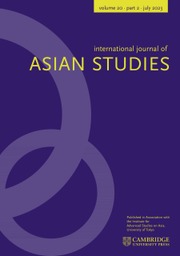Article contents
EMOLUMENTS, INSTITUTIONS, AND THE FAILURE OF BUREAUCRATIC REFORM IN THE YUAN DYNASTY
Published online by Cambridge University Press: 20 July 2018
Abstract
Beginning in 1260, the Mongol ruler Khubilai Khan embarked on the creation of a Chinese-style bureaucracy to govern his realm more effectively. At the same time, the court began to promulgate a salary code for its officials. Though both processes were led in large part by Chinese scholar-officials, this group continually complained about the shortcomings of the salary code and its negative effects on the bureaucracy. By studying their writings on salaries and official government records, this article will demonstrate that the Chinese literati used their complaints about the salary code to level criticisms against flaws in the administration and to push for bureaucratic reform, and that the Yuan court was genuinely concerned about the salary problem and took measures to alleviate it. Yet the court never actually reformed, and this article will ultimately aim to show how the response to the issue of salaries reflected the Mongols’ desires to cling to the power and privilege that was afforded to them by a bureaucratic structure which preserved much of their traditional steppe institutions and values.
Keywords
- Type
- Research Article
- Information
- Copyright
- Copyright © Cambridge University Press 2018
References
REFERENCES
- 1
- Cited by


